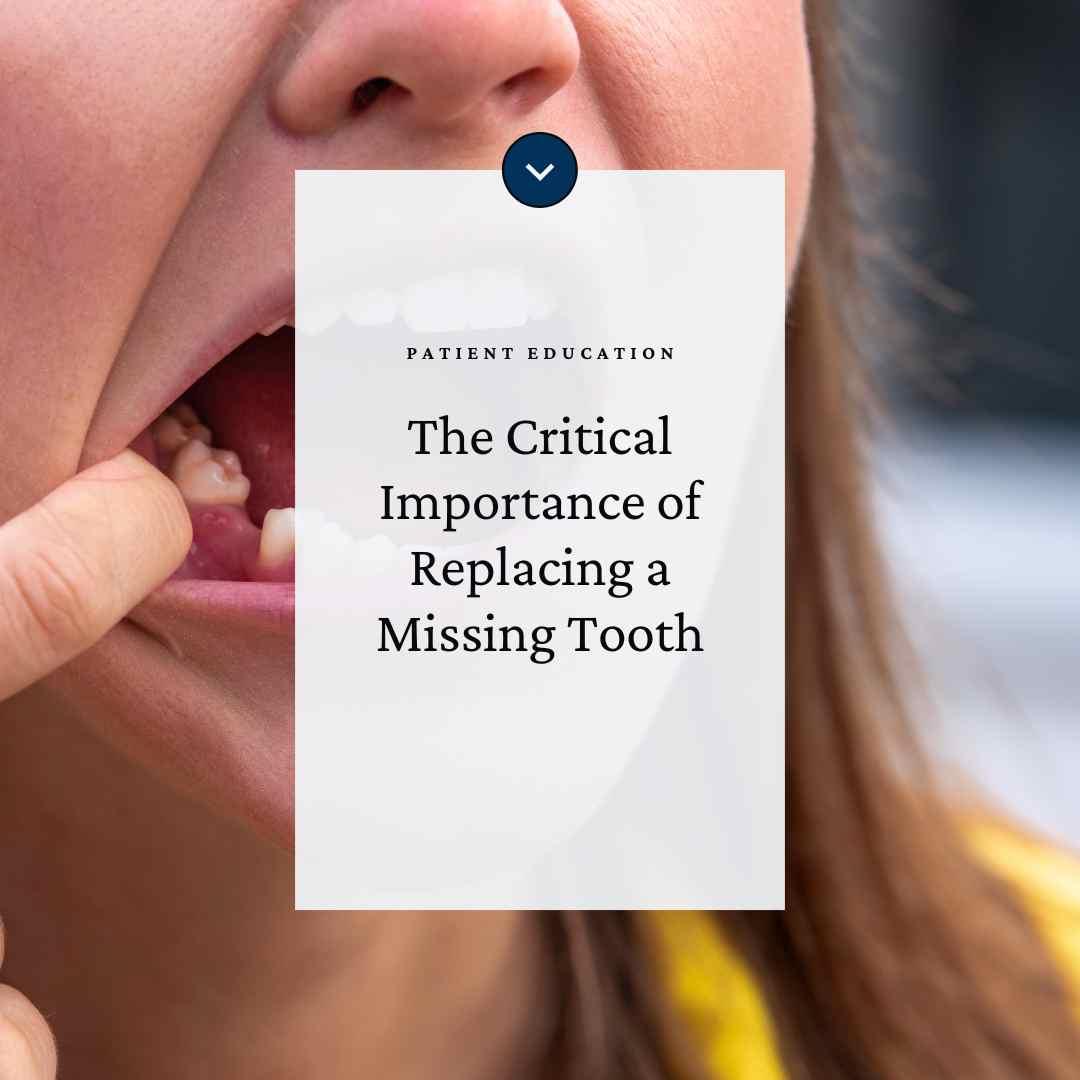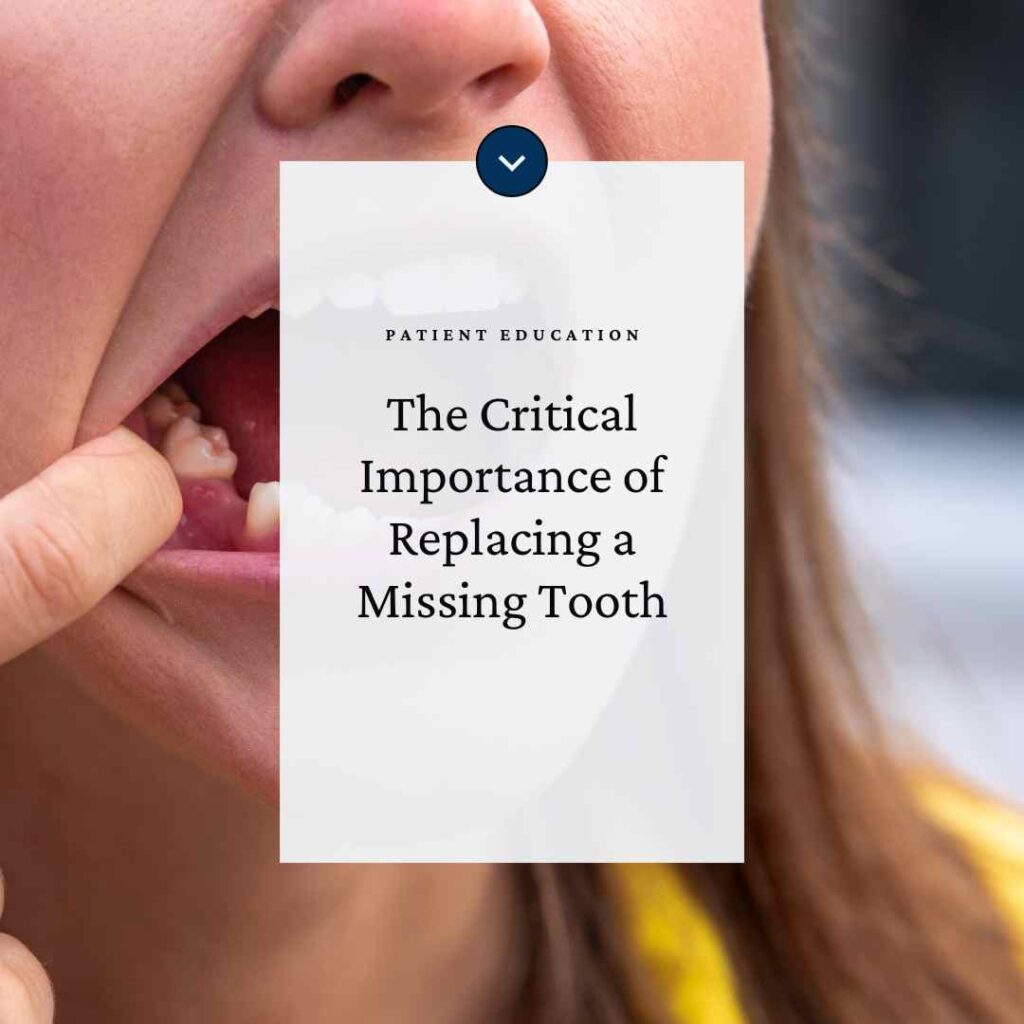The Critical Importance of Replacing a Missing Tooth


A missing tooth can have a profound impact on a person's life, affecting more than just their smile. It can shake their confidence, alter their eating habits, and even lead to further oral health issues. Many people don't realize that a single missing tooth can set off a chain reaction, potentially causing bone loss and changes to their facial structure over time.
Replacing a missing tooth isn't just about restoring a beautiful smile; it's about preserving overall health and well-being. This article will explore the crucial role teeth play in our health, the immediate effects of tooth loss, and the long-term consequences if left untreated. We'll also compare different tooth replacement options, from dental implants to bridges, to help readers understand their choices for addressing this common dental concern.
Table of Contents
The Role of Teeth in Overall Health
Importance in Digestion
Teeth play a crucial role in the digestive process, serving as the first step in breaking down food. When a person puts food in their mouth, their teeth break it into smaller pieces, making it easier to swallow and digest [1]. This process is essential because the body can't absorb nutrients from large chunks of food. The chewing action also stimulates the release of saliva, which contains enzymes that start breaking down carbohydrates into simple sugars [1].
Healthy teeth are vital for proper nutrition. Without them, chewing can become painful or even impossible, leading to dietary restrictions that may affect overall health [2]. In fact, teeth are so important that babies don't start eating solid foods until their baby teeth emerge, allowing them to chew and digest food properly [3].
Connection to Systemic Health
The health of our teeth and gums is closely tied to our overall well-being, often referred to as a window to our general health [2]. Good oral health goes beyond just avoiding cavities; it can help prevent serious diseases and reduce the risk of complications from chronic conditions [2].
Research suggests that oral bacteria can enter the bloodstream, potentially causing inflammation and infections in other parts of the body [2]. This connection has led to associations between oral health and various systemic conditions, including:
- Cardiovascular diseases
- Diabetes
- Respiratory infections
- Alzheimer's disease and dementia
- Rheumatoid arthritis
- Certain cancers [4]
For instance, people with gum disease may have a harder time controlling their blood sugar levels, highlighting the importance of oral health for those with diabetes [5]. Additionally, oral bacteria have been linked to respiratory infections and pneumonia [2].
While these associations don't necessarily imply causation, they underscore the importance of maintaining good oral health as part of overall health management [4]. Regular dental care, including daily brushing and flossing, along with professional cleanings, is essential for preventing oral health issues and potentially reducing the risk of related systemic conditions [1] [2].
Immediate Effects of Tooth Loss
Changes in Bite and Chewing Ability
Losing a tooth can have an immediate impact on a person's ability to chew and bite properly. When a tooth is missing, it alters the balance of the entire dental structure, affecting how the remaining teeth come together. This change in bite can make it challenging to eat certain foods, potentially leading to dietary restrictions and nutritional concerns.
Speech Alterations
Missing teeth can significantly affect a person's speech. The teeth play a crucial role in forming certain sounds, particularly those that require contact between the teeth and lips or tongue. For instance, the upper front teeth are essential for producing sounds like “th,” “f,” and “v,” while the lower front teeth help form “s” and “z” sounds [6]. When these teeth are missing, it becomes difficult to articulate words clearly, potentially leading to speech problems and communication challenges.
Esthetic Concerns
The loss of a tooth, especially in the visible part of the mouth, can have an immediate impact on a person's appearance and self-esteem. It can alter the shape of the face, as teeth provide structural support for the lips and mouth [7]. This change in facial features can be particularly noticeable in older individuals due to decreased skin elasticity. Moreover, the psychological impact of missing teeth goes beyond mere esthetics. It can lead to feelings of self-consciousness, social anxiety, and even depression [8]. Many individuals may develop coping mechanisms, such as avoiding smiling or covering their mouth, which can hinder emotional healing and social interactions.
Long-term Consequences of Untreated Tooth Loss
Progressive Bone Loss
When a tooth is lost, the jawbone beneath it loses stimulation, leading to a process called resorption. This causes the bone to break down and weaken over time [9]. Research has shown that significant bone loss occurs during the first year after tooth extraction, and this process continues even without dentures [9]. The lack of pressure from chewing and biting accelerates this bone loss, as the jawbone relies on this stimulation to maintain its structure and density [9].
Facial Structure Changes
Untreated tooth loss can have a profound impact on facial appearance. As the jawbone deteriorates, it can lead to a condition known as facial collapse [10]. This results in a sunken or hollow appearance of the face, with more visible vertical lines, making a person look older than their actual age [11]. The loss of teeth also affects the fullness of the lips, causing them to appear thinner [11]. Additionally, the muscle ligaments in the face weaken, leading to sagging facial tissue in the cheeks [11].
Increased Risk of Further Tooth Loss
Losing one tooth can set off a chain reaction, potentially leading to the loss of more teeth. When a tooth is missing, the surrounding teeth may shift to fill the gap, causing misalignment and an uneven jawline [10]. This shift can make it more challenging to clean teeth properly, increasing the risk of tooth decay and gum disease [10]. Periodontal disease, one of the leading causes of tooth loss, can spread more easily in these conditions [12]. Furthermore, the altered bite pattern can cause discomfort, problems with teeth grinding, and jaw pain, all of which can contribute to further tooth loss if left untreated [10].
Comparing Tooth Replacement Options
Dental Implants vs. Bridges vs. Dentures
When it comes to replacing missing teeth, patients have several options to choose from. Each option has its own set of advantages and disadvantages, making it crucial to understand the differences between them.
Dental implants are surgically inserted into the jawbone, acting as artificial tooth roots [1]. They offer a natural look and feel, lasting 15 to 20 years with proper care [1]. Implants prevent bone loss and keep adjacent teeth from moving [1]. However, they are more expensive and require surgery [1].
Dental bridges, on the other hand, close the gap created by missing teeth by connecting to the surrounding teeth [1]. They maintain facial shape and prevent remaining teeth from shifting [1]. Bridges can last 5 to 15 years but may require alteration of natural teeth and don't address bone loss [1].
Dentures are removable artificial teeth and gums that can replace multiple missing teeth [1]. They provide a natural appearance and are more affordable than other options [1]. However, dentures may slip, making it difficult to speak, and need regular refitting [1].
Factors to Consider When Choosing
Several factors come into play when selecting the most suitable tooth replacement option. Age is a significant consideration, with dental implants often being ideal for younger individuals due to their longevity and ability to preserve facial structure [3].
The number of missing teeth also influences the choice. For one or two consecutive missing teeth, a dental bridge is generally recommended [3]. For full arch replacement, dentures or implant-supported dentures are comprehensive options [3].
Underlying health conditions can affect the suitability of certain options. For instance, systemic diseases like diabetes may make a person less ideal for dental implants [3]. Jawbone density is crucial, especially for implants and implant-supported dentures [3].
Timeline is another factor to consider. Dental implants require a longer process, typically taking five to eight months for completion [3]. In contrast, bridges and dentures offer quicker solutions [3].
Ultimately, the choice depends on individual needs, preferences, and overall oral health. Consulting with a dentist can help determine the most suitable option for each unique situation.
Conclusion
Replacing a missing tooth is more than just a cosmetic fix; it has a profound impact on overall health and well-being. From maintaining proper digestion to preventing further oral health issues, the importance of addressing tooth loss cannot be overstated. The choice of replacement method, whether it's dental implants, bridges, or dentures, depends on individual circumstances and needs.
Ultimately, taking action to replace a missing tooth is a crucial step to preserve oral health and quality of life. Early intervention can prevent long-term consequences like bone loss and changes in facial structure. If you're curious to learn more about replacing your own missing teeth, give us a call at 620-275-9157. Remember, a healthy smile is a gateway to overall health and confidence.
FAQs
What are the benefits of replacing a missing tooth?
Replacing a missing tooth is crucial for maintaining both the esthetics and functionality of your smile. It helps prevent future dental problems, preserves oral function, enhances your smile, and can even prevent bone loss when dental implants are used.
What are the consequences of not replacing a missing tooth?
Failing to replace a missing tooth can lead to several oral health issues. It increases the risk of gum disease and bacterial infections, and can cause the remaining teeth to shift, altering their alignment and potentially leading to more complex dental issues.
What are the negative effects of having a missing tooth?
A missing tooth can lead to several problems including poor jaw function, creation of malocclusions (misaligned teeth), drifting of teeth into empty spaces, bite alignment issues, increased wear on remaining teeth, jaw stress, and significant jaw bone loss, with up to a 25% reduction in the first year alone.
What occurs if a tooth is extracted and not replaced?
If a tooth is extracted and not replaced, the adjacent teeth may shift, become crooked, or create new gaps. Additionally, the tooth opposite the missing tooth might begin to super-erupt, growing out of its normal position due to the lack of opposition, which can further complicate oral health.
References
[1] – https://www.smilegeneration.com/blog/ask-a-dentist/importance-of-replacing-missing-teeth/
[2] – https://www.drfiat.com/dental-blog/why-replacing-lost-teeth-is-important/
[3] – https://www.nowdental.com/blog/319543-the-importance-of-replacing-missing-teeth
[4] – https://www.ua5pointsdentistry.com/tooth-loss-help/
[5] – https://www.hendricksfamilydentistry.com/blog/why-replacing-lost-teeth-is-important/
[6] – https://www.lewisdentistry.com/dentures/when-to-get-implants-dentures/missing-teeth-affect-speech/
[7] – https://southbaydental.com/why-do-missing-teeth-change-your-facial-esthetic/
[8] – https://www.richterdental.com/beyond-esthetics-emotional-toll-of-missing-teeth-on-mental-well-being
[9] – https://solutionsdentalimplants.com/p/dental-implants-Sun-City-West-Arizona-The-Story-on-Progressive-Bone-Loss-p27507.asp
[10] – https://www.implantperiocenter.com/the-consequences-of-tooth-loss-on-your-jawline-and-facial-appearance/
[11] – https://www.islanddailydentalcare.com/blog/2023/04/09/how-tooth-loss-can-affect-the-shape-of-your-face/
[12] – https://www.health.harvard.edu/blog/tooth-loss-truth-its-no-longer-about-the-tooth-fairy-202108252578
The information available on the Website is for general health information only and is not intended to be a substitute for professional medical advice, diagnosis or treatment. You should not rely exclusively on information provided on the Website for your health needs. All specific medical questions should be presented to your own health care provider and you should seek medical advice regarding and before making any changes related to your health.
If you choose to use the information available on the Website without prior consultation with and consent of your physician, you are agreeing to accept full responsibility for your decisions and agreeing to hold harmless Randall K. McVey, DMD PA, its agents, employees, contractors, and any affiliated companies from any liability with respect to injury or illness to you or your property arising out of or connected with your use of this information.
MedicAL DISCLAIMER
Patient Portal
help
Disclaimers
HIPAA
Accessibility
Privacy Policy & Cookie Policy
Terms & Conditions